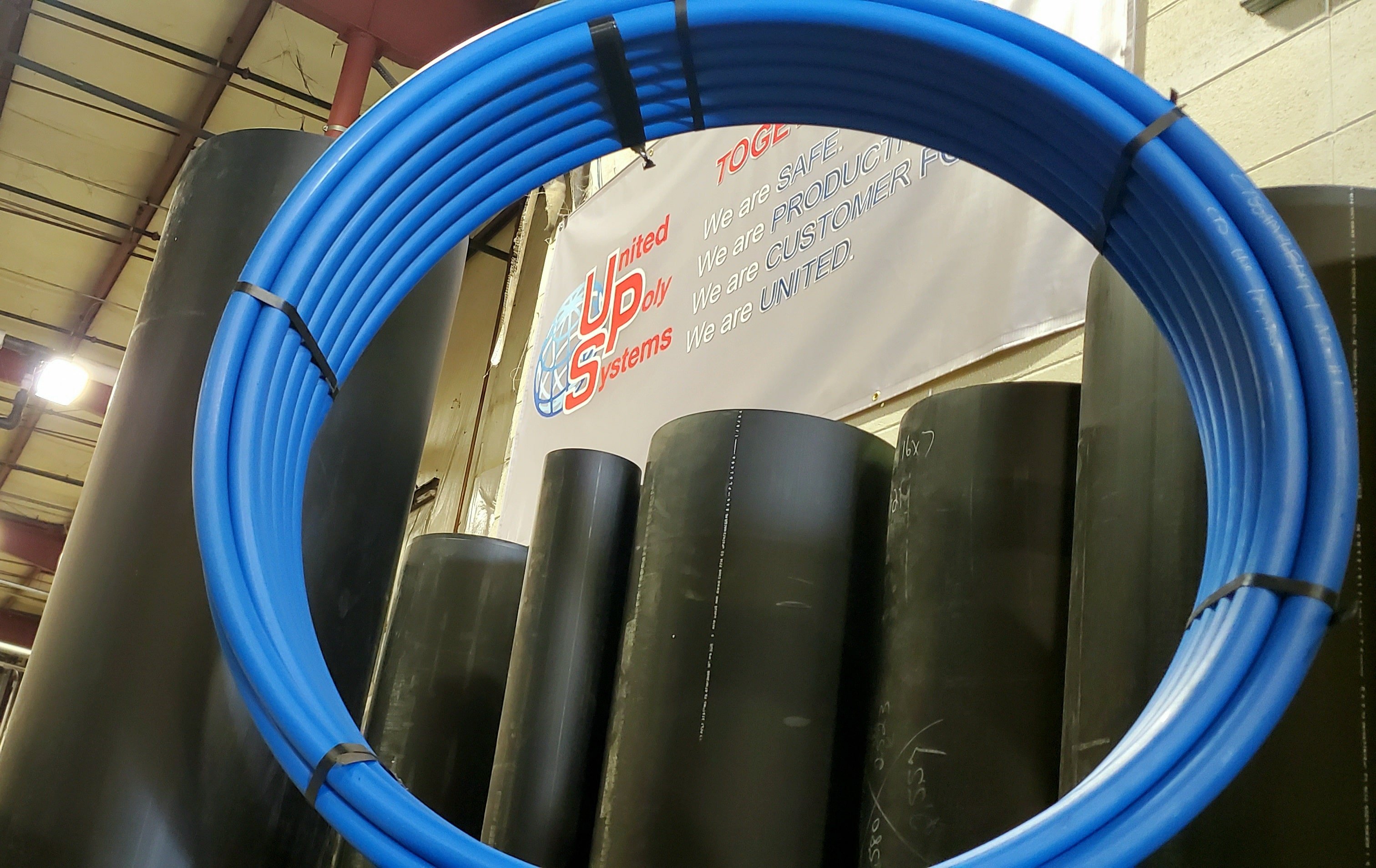How American Plastics HDPE Pipe for Oilfield Supports Energy Infrastructure
Wiki Article
Understanding the Secret Perks of HDPE Pipe for Water and Wastewater Monitoring
Using HDPE pipeline in water and wastewater administration offers many benefits that merit factor to consider. Its extraordinary sturdiness and lengthy life-span make it a recommended option for several jobs. Additionally, the material's resistance to rust and chemical damages enhances its reliability in numerous atmospheres. Nonetheless, the advantages extend beyond just longevity and resistance. Discovering its cost-effectiveness and ecological effect exposes much more compelling factors for its extensive fostering in contemporary infrastructureExceptional Toughness and Durability

HDPE pipe attracts attention for its remarkable longevity and long life, making it a preferred option in water management systems. Created from high-density polyethylene, these pipelines can stand up to considerable stress and anxiety, guaranteeing trusted efficiency over time. Their durable nature allows them to withstand extreme ecological conditions, including temperature changes and soil activities, which can trigger various other materials to stop working.
The lifespan of HDPE pipelines commonly goes beyond 50 years, giving an affordable service for districts and sectors alike. Furthermore, the material's light-weight residential properties streamline installment, minimizing labor expenses and timeframes. This sturdiness reduces the need for frequent repair services or replacements, further improving its financial appeal.
In water administration applications, the reliability of HDPE pipelines suggests fewer interruptions and improved solution continuity, making them indispensable to sustainable framework development. The combination of resilience and long life solidifies HDPE's duty as a keystone in efficient water monitoring services.

Resistance to Corrosion and Chemical Damages
While numerous materials surrender to corrosion and chemical damage gradually, HDPE pipelines exhibit exceptional resistance, making them suitable for various water monitoring applications. This strength originates from the molecular structure of high-density polyethylene, which is naturally non-reactive and does not wear away like metals or degrade from exposure to harsh chemicals. Consequently, HDPE is highly effective in environments with hostile substances, such as wastewater systems that might include acids, bases, and natural solvents.
Additionally, HDPE pipelines can stand up to ecological variables such as dirt acidity and saline problems, better improving their viability for diverse applications (hdpe pipe fittings Midland TX). Their capacity to keep architectural stability gradually lowers the danger of leakages and failures, which is essential in guaranteeing the safety and security and reliability of water circulation and wastewater management systems. Subsequently, the resistance to rust and chemical damage noticeably contributes to the overall performance and long life of HDPE piping options
Cost-Effectiveness and Economic Advantages
When taking into consideration the monetary implications of water management systems, the cost-effectiveness of HDPE pipes becomes evident. These pipes supply lower installation and upkeep expenses contrasted to standard products like metal or concrete. Their light-weight nature streamlines transport and setup, resulting in minimized labor costs. Furthermore, HDPE pipelines display a long life-span, typically exceeding 50 years, which equates to fewer replacements and long-lasting savings.In addition, the resistance of HDPE to deterioration and chemical damage decreases the requirement for pricey repairs and substitutes. The pipelines also support effective water flow, reducing power prices connected with pumping systems. By reducing leaks and water loss, HDPE pipes add to substantial economic advantages for municipalities and markets alike. Generally, the preliminary financial investment in HDPE piping can yield considerable economic returns over the life expectancy of the water management system, making it a sensible option for sustainable facilities growth.
Ecological Sustainability and Lowered Effect

Convenience and Flexibility in Installment
As a result of their one-of-a-kind residential properties, HDPE pipes offer remarkable convenience and flexibility in installment, making them suitable for a large range of applications. Their light-weight nature enables easier handling and transportation, minimizing labor prices and setup time. HDPE pipelines can be bent and formed to fit various surfaces and task demands, which is especially valuable in challenging atmospheres.Additionally, their resistance to deterioration and chemical damages enables installment in diverse settings without the requirement for specialized protective layers. The capability to fuse joints develops a constant, leak-free system, boosting the total integrity and reliability of the setup. HDPE's adaptability additionally fits ground motion, minimizing the danger of damage in locations susceptible to shifting dirt. In general, these qualities make HDPE pipelines not just versatile but likewise a recommended option for water and wastewater management systems.
Regularly Asked Inquiries
Exactly How Does HDPE Pipe Compare to PVC in Water Monitoring Applications?
HDPE pipe provides premium adaptability, resistance to corrosion, and durability compared to official site PVC. Its lighter weight facilitates much easier setup, while its lengthy life expectancy lowers replacement prices, making HDPE a recommended option in water management applications.What Is the Life-span of HDPE Piping Under Normal Conditions?
Under normal conditions, HDPE pipes can have a life expectancy varying from 50 to 100 years. Their toughness and resistance to deterioration add to their long-lasting performance in numerous applications, making them a trusted choice for facilities.Are HDPE Water Lines Recyclable After Their Life Span?
Yes, HDPE pipes are recyclable after their life span. American Plastics HDPE Pipe Manufacturing. They can be processed and repurposed into new items, greatly reducing environmental effect see here now and promoting sustainability within the sector, making them an eco-friendly selection for piping optionsWhat Is the Setup Refine for HDPE Pipes?
The setup process for HDPE pipes includes site prep work, trenching, pipeline blend or mechanical signing up with, backfilling, and pressure screening. Correct methods ensure a resilient and efficient system for delivering water and wastewater successfully.Can HDPE Water Lines Be Made Use Of for Both Potable and Non-Potable Water Equipments?
Yes, HDPE pipelines can be utilized for both potable and non-potable water systems. Their adaptability, longevity, and resistance to deterioration make them ideal for various applications, guaranteeing safe and effective transportation of water in various contexts.Report this wiki page